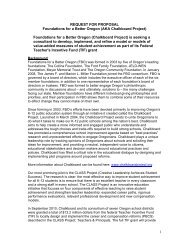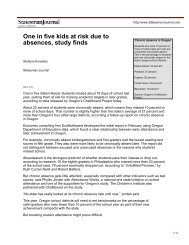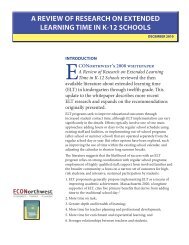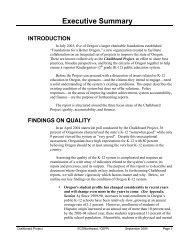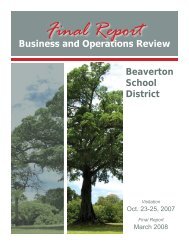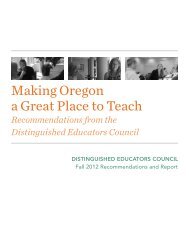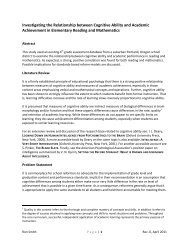Tapping the Potential - Alliance for Excellent Education
Tapping the Potential - Alliance for Excellent Education
Tapping the Potential - Alliance for Excellent Education
You also want an ePaper? Increase the reach of your titles
YUMPU automatically turns print PDFs into web optimized ePapers that Google loves.
TA P P I N G T H E P O T E N T I A L : R E TA I N I N G A N D D E V E L O P I N G H I G H - Q U A L I T Y N E W T E A C H E R Swell as encourage higher-quality teaching.In this way, mentoring becomes atype of career ladder that promotes professionalgrowth.Still o<strong>the</strong>r induction programs release<strong>the</strong>ir mentors from some or all of <strong>the</strong>irnormal workload to observe and assessteachers, making some mentors full-timecoaches. 73 Arguably, release time is essentialto successful induction because itgives mentors time and space to supportand assess novice teachers.Through mentoring, comprehensiveinduction builds <strong>the</strong> teaching capacity ofexisting teachers, who <strong>the</strong>n become leadersin <strong>the</strong> profession. It should be no surprisethat mentors report using practices thatimprove student achievement, and that<strong>the</strong>y experience greater job satisfaction.It Takes a Village: CommonPlanning Time and CollaborationIf it takes a village to raise children, itfollows that a community of teachers canmore effectively instruct <strong>the</strong>m than isolatedindividuals. 74 Teachers who plantoge<strong>the</strong>r stay in teaching longer, and <strong>the</strong>ybecome a community of professionals, allof whom are responsible <strong>for</strong> studentlearning. As Joellen Killion at <strong>the</strong>National Staff Development Council putsit, “When opportunities <strong>for</strong> collaborationare present in a school’s culture, teachersare typically more satisfied with <strong>the</strong>irwork, more actively involved in <strong>the</strong>schools, and work more productivelytoward school goals.” 75Collaboration offsets <strong>the</strong> isolationmany teachers feel early in <strong>the</strong>ir careers,and it fosters a collegial work environmentso that teaching becomes a cultureof cooperation and continuous learning.The best collaboration includes teachersand leaders across all experience levels soall teachers can learn from one ano<strong>the</strong>r.Common planning time is not an extrafaculty meeting or a <strong>for</strong>um to discuss currentevents; it should be structured collaborationthat helps teachers connect whatand how <strong>the</strong>y teach to student achievement.Every teacher, particularly a beginningone, needs time with o<strong>the</strong>r teachersto examine how her or his own teachingleads to student learning.By itself, time set aside <strong>for</strong> planningwill not improve student per<strong>for</strong>mance.Time must be accompanied by strategiesand supports that help teachers reflect on<strong>the</strong>ir practice. Thus, collaboration is asmuch a change in school culture as a wayto organize meetings.Groups of teachers collectively focusedon improving instruction can improvestudent achievement. Researchers lookingat Cincinnati schools found that, aftercontrolling <strong>for</strong> personal background, studentstaught by teachers who were part ofstructured common planning sessions—where school leaders provided <strong>the</strong>m timeand strategies to reflect on teaching andstudent achievement—learned more. 76The difference in student outcomes was<strong>the</strong> difference in teacher collaboration.Collaborative strategies that improveinstruction may include:• Developing lesson plans and curriculum.Because new teachers are less experienced<strong>the</strong>y need more time to developlesson plans and classroom curriculum.David Kauffman, in a 2002report <strong>for</strong> <strong>the</strong> Harvard Project on <strong>the</strong>Next Generation of Teachers, foundthat many beginning teachers feel“lost at sea” and “overwhelmed by <strong>the</strong>responsibility and demands of designingcurriculum and planning daily lessons.”New teachers need help deter-Common planning time isnot an extra facultymeeting or a <strong>for</strong>um todiscuss current events; itshould be structuredcollaboration that helpsteachers connect whatand how <strong>the</strong>y teach tostudent achievement.15






